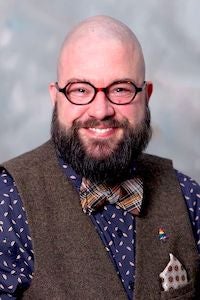URI nursing Assistant Professor Jordon Bosse earns federal grant to adapt curriculum
Transgender and nonbinary young adults—individuals who have a gender that is different than their assigned sex at birth—have more than triple the risk of depression and anxiety than those whose gender is congruent with their sex at birth. Despite the known associations between gender minority stress and struggles with mental health, few interventions exist to address the distress felt by so many in the LGBTQ+ community.
University of Rhode Island nursing Assistant Professor Jordon Bosse aims to help alleviate that stress in the long term. First, he will explore whether using self-compassion—the act treating oneself with kindness instead of self-criticism in painful or difficult times—could be a feasible option. He plans to employ the “Mindful Self-Compassion” program, developed by a leading psychologist, which combines the skills of mindfulness and self-compassion, potential tools for emotional resilience.
“The reason there are physical and mental health disparities among LGBTQ folks more broadly is because of unique stress they experience in everyday life because of their sexual orientation or gender identity—things like discrimination, rejection, violence, victimization,” Bosse said. “People can internalize those negative messages, resulting in feelings like shame. They may feel like they need to hide their identity to be safe or to not experience negative consequences. Over time, that really takes a toll on people, constantly wondering who knows and who doesn’t, and trying to hide who you really are. That creates its own other stress in trying to heal the first stress. It can become cumulative.”
The Mindful Self-Compassion intervention will be delivered virtually and includes reflective exercises, guided meditations, informal daily practices, and a retreat. The activities teach participants to recognize suffering in themselves, and respond to their suffering with warmth and kindness, the way they might treat a friend or loved one.
Funded by five-year, $600,000 career development grant from the National Institutes of Health’s National Center for Complementary and Integrative Health, Bosse will train to teach the curriculum, then deliver the intervention to five consecutive groups of 10 transgender and nonbinary young adults who will be recruited through community organizations in the Northeast. Bosse will follow up with the groups after 12 weeks to further understand their experience of taking part in the program.
“I took the course myself two years ago, and I was thinking about how some of the skills we learned could have been really helpful for me as a struggling twenty-something,” Bosse said. “Early studies have shown people had improved mental health after the program, and those benefits were sustained after 12 months. I started looking to see if anyone had used this type of intervention with LGBTQ folks, and they haven’t. So it seemed like a real opportunity.”
The feasibility and acceptability of a community-based intervention like this could provide an important means of group-based support for transgender and nonbinary young adults, Bosse said. He plans to use participants’ feedback to figure out how to make the program and activities more helpful, and applicable to trans- and nonbinary people specifically.
“There’s real power in having a teacher who looks like you or knows some of what you might be experiencing, in a way that can just be really healing for folks,” Bosse said, noting he is recruiting transgender and nonbinary adults to teach the course with him. “Historically, I’ve looked at mental health of LGBTQ+ people in the context of family relationships and social environment. Now that we have a growing body of knowledge about what is challenging for folks, I wanted to think about things that could be supportive and provide resources. Despite all the stresses, LGBTQ+ people are still thriving. That inspires me. It’s important we think about ways to highlight, draw on, and build upon the existing strengths in the community.”
Bosse is currently building a community advisory board for the study. Transgender and nonbinary people under the age of 30 with an active meditation or self-compassion practice can contact him at Jordon.bosse@uri.edu for more information.

